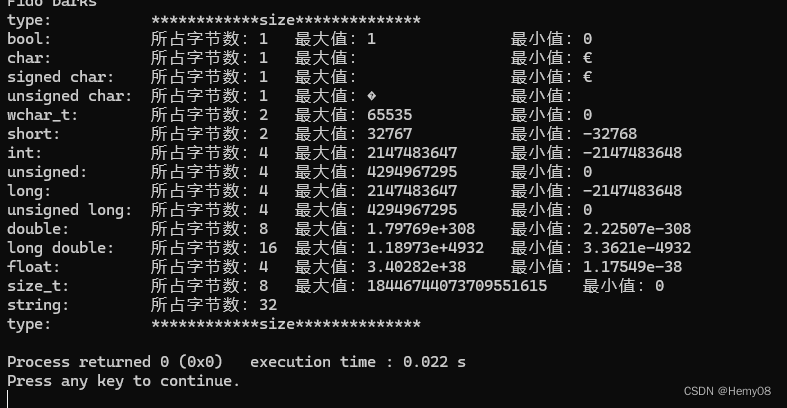常见类型
| 类型 | 位 | 范围 |
|---|---|---|
| char | 1 个字节 | -128 到 127 或者 0 到 255 |
| unsigned char | 1 个字节 | 0 到 255 |
| signed char | 1 个字节 | -128 到 127 |
| int | 4 个字节 | -2147483648 到 2147483647 |
| unsigned int | 4 个字节 | 0 到 4294967295 |
| signed int | 4 个字节 | -2147483648 到 2147483647 |
| short int | 2 个字节 | -32768 到 32767 |
| unsigned short int | 2 个字节 | 0 到 65,535 |
| signed short int | 2 个字节 | -32768 到 32767 |
| long int | 8 个字节 | -9,223,372,036,854,775,808 到 9,223,372,036,854,775,807 |
| signed long int | 8 个字节 | -9,223,372,036,854,775,808 到 9,223,372,036,854,775,807 |
| unsigned long int | 8 个字节 | 0 到 18,446,744,073,709,551,615 |
| float | 4 个字节 | 精度型占4个字节(32位)内存空间,+/- 3.4e +/- 38 (~7 个数字) |
| double | 8 个字节 | 双精度型占8 个字节(64位)内存空间,+/- 1.7e +/- 308 (~15 个数字) |
| long long | 8 个字节 | 双精度型占8 个字节(64位)内存空间,表示 -9,223,372,036,854,775,807 到 9,223,372,036,854,775,807 的范围 |
| long double | 16 个字节 | 长双精度型 16 个字节(128位)内存空间,可提供18-19位有效数字。 |
| wchar_t | 2 或 4 个字节 | 1 个宽字符 |
示例:
#include<iostream>
#include <limits>
using namespace std;
int main()
{
cout << "type: \t\t" << "************size**************"<< endl;
cout << "bool: \t\t" << "所占字节数:" << sizeof(bool) << "\t最大值:" << (numeric_limits<bool>::max)() << "\t\t最小值:" << (numeric_limits<bool>::min)() << endl;
cout << "char: \t\t" << "所占字节数:" << sizeof(char) << "\t最大值:" << (numeric_limits<char>::max)() << "\t\t最小值:" << (numeric_limits<char>::min)() << endl;
cout << "signed char: \t" << "所占字节数:" << sizeof(signed char) << "\t最大值:" << (numeric_limits<signed char>::max)() << "\t\t最小值:" << (numeric_limits<signed char>::min)() << endl;
cout << "unsigned char: \t" << "所占字节数:" << sizeof(unsigned char) << "\t最大值:" << (numeric_limits<unsigned char>::max)() << "\t\t最小值:" << (numeric_limits<unsigned char>::min)() << endl;
cout << "wchar_t: \t" << "所占字节数:" << sizeof(wchar_t) << "\t最大值:" << (numeric_limits<wchar_t>::max)() << "\t\t最小值:" << (numeric_limits<wchar_t>::min)() << endl;
cout << "short: \t\t" << "所占字节数:" << sizeof(short) << "\t最大值:" << (numeric_limits<short>::max)() << "\t\t最小值:" << (numeric_limits<short>::min)() << endl;
cout << "int: \t\t" << "所占字节数:" << sizeof(int) << "\t最大值:" << (numeric_limits<int>::max)() << "\t最小值:" << (numeric_limits<int>::min)() << endl;
cout << "unsigned: \t" << "所占字节数:" << sizeof(unsigned) << "\t最大值:" << (numeric_limits<unsigned>::max)() << "\t最小值:" << (numeric_limits<unsigned>::min)() << endl;
cout << "long: \t\t" << "所占字节数:" << sizeof(long) << "\t最大值:" << (numeric_limits<long>::max)() << "\t最小值:" << (numeric_limits<long>::min)() << endl;
cout << "unsigned long: \t" << "所占字节数:" << sizeof(unsigned long) << "\t最大值:" << (numeric_limits<unsigned long>::max)() << "\t最小值:" << (numeric_limits<unsigned long>::min)() << endl;
cout << "double: \t" << "所占字节数:" << sizeof(double) << "\t最大值:" << (numeric_limits<double>::max)() << "\t最小值:" << (numeric_limits<double>::min)() << endl;
cout << "long double: \t" << "所占字节数:" << sizeof(long double) << "\t最大值:" << (numeric_limits<long double>::max)() << "\t最小值:" << (numeric_limits<long double>::min)() << endl;
cout << "float: \t\t" << "所占字节数:" << sizeof(float) << "\t最大值:" << (numeric_limits<float>::max)() << "\t最小值:" << (numeric_limits<float>::min)() << endl;
cout << "size_t: \t" << "所占字节数:" << sizeof(size_t) << "\t最大值:" << (numeric_limits<size_t>::max)() << "\t最小值:" << (numeric_limits<size_t>::min)() << endl;
cout << "string: \t" << "所占字节数:" << sizeof(string) << endl;
// << "\t最大值:" << (numeric_limits<string>::max)() << "\t最小值:" << (numeric_limits<string>::min)() << endl;
cout << "type: \t\t" << "************size**************"<< endl;
return 0;
}输出结果如下:

类型限定符
类型限定符提供了变量的额外信息,用于在定义变量或函数时改变它们的默认行为的关键字。
| 限定符 | 含义 |
|---|---|
| const | const 定义常量,表示该变量的值不能被修改。 |
| volatile | 修饰符 volatile 告诉该变量的值可能会被程序以外的因素改变,如硬件或其他线程。。 |
| restrict | 由 restrict 修饰的指针是唯一一种访问它所指向的对象的方式。只有 C99 增加了新的类型限定符 restrict。 |
| mutable | 表示类中的成员变量可以在 const 成员函数中被修改。 |
| static | 用于定义静态变量,表示该变量的作用域仅限于当前文件或当前函数内,不会被其他文件或函数访问。 |
| register | 用于定义寄存器变量,表示该变量被频繁使用,可以存储在CPU的寄存器中,以提高程序的运行效率。 |
const实例:
const int NUM = 10; // 定义常量 NUM,其值不可修改
const int* ptr = &NUM; // 定义指向常量的指针,指针所指的值不可修改
int const* ptr2 = &NUM; // 和上面一行等价volatile 实例:
volatile int num = 20; // 定义变量 num,其值可能会在未知的时间被改变mutable 实例:
class Example {
public:
int get_value() const {
return value_; // const 关键字表示该成员函数不会修改对象中的数据成员
}
void set_value(int value) const {
value_ = value; // mutable 关键字允许在 const 成员函数中修改成员变量
}
private:
mutable int value_;
};static 实例:
void example_function() {
static int count = 0; // static 关键字使变量 count 存储在程序生命周期内都存在
count++;
}register 实例:
void example_function(register int num) {
// register 关键字建议编译器将变量 num 存储在寄存器中
// 以提高程序执行速度
// 但是实际上是否会存储在寄存器中由编译器决定
}






 本文详细解释了C++中的不同类型限定符(如const、volatile、restrict、mutable、static和register),以及它们如何影响变量的行为、内存占用和编译器优化。
本文详细解释了C++中的不同类型限定符(如const、volatile、restrict、mutable、static和register),以及它们如何影响变量的行为、内存占用和编译器优化。














 313
313

 被折叠的 条评论
为什么被折叠?
被折叠的 条评论
为什么被折叠?








